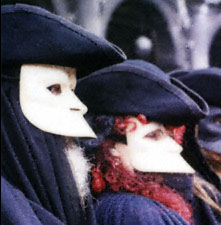Lul-Film
...
|
After 2009 :
Lul-Film ...
|
|
Cinema, radio, television, magazines are a school of inattention: people look without seeing, listen in without hearing. - Robert Bresson
[ advertising space : webmaster ] Enter the name of a movie, TV show, or person and then click "Go" to get more information about it/them from imdb.com. 2006: no class project? ... Cameras, tapes, everything you need, you have to find yourself. The department doesn't have the equipment to lend or rent. Film-making is a twentieth-century art born of science. [ The Film-Maker's Art, see textbooks ] ... [ do not plan to teach this class anymore ] * pages in this directory will be used for film analysis ( and film600 )
2006 SummaryFilmmaking is a course which introduces students to the art of making films. Students in this course are expected to achieve a basic mastery of filmmaking theory and technique using video cameras.Class Projects: You will be working in groups of 4. Each member of the group will have a specific task. The whole group will collaborate to create the informative project. Roles, depending on your project:
Project #1- Short Screenplay (10-15 minutes) Treatment + Outline + 3 Drafts Cuts and adaptation for the screen -- 5 scenes (Bianca Story) from the Taming of the Shrew for Theatre UAF Fall 2004 main stage production * 
NotesFilm & Literature *
film.vtheatre.net
|
 * Classes * Virtual Theatre * Bookmark vTheatre! Mailing List & News -- subscribe yourself * The Book of Spectator *
* Classes * Virtual Theatre * Bookmark vTheatre! Mailing List & News -- subscribe yourself * The Book of Spectator * 
The old class page, this is the page for Fall 2001 course (it should be considered as "Fundamentals of Film Directions"). Nevertheless, by the end of the semester you should have a decent tape in your hand to send to grad schools.There are three areas to focus: scripting, shooting, editing. And while through it learn a little bit about the process itself. Also, the skills that are required to be a filmmaker (team work, understanding the artistic and technical tasks).
In the right table on every page is the link to ONLINE directing class from Yahoo, where the student scripts are posted. Also, there are archives of the Directors Forum, List, you might subscribe to.
Since this is an intro to basics of the filmmaking, I have to cover two different subjects: aesthetics (film language) and the production aspect. Everything in twelve weeks! And this is why this class is introduction ONLY!
[The pages are updated, when I teach this class.]

(c)2004-2006 Get Site Info
possible plan(s)
script breakdown 10% the studio production team 5% directing terminology 5% talent and camera blocking 10% makeup 5% timing 5% technical direction 10% directing 50%Examine it:
Class: Writing The Screenplay 101 Meets four times for an hour each. Students will accomplish at least ten pages, not exceeding 30 pages, of script development. Students will learn the basics of screenwriting and ascertain enough knowledge to continue writing their screenplay and finish. First Class Finding the Heart of your story - Plot or Character driven, which is best? - Cause and Effect (Characters and Plot) - Thinking about Characters - Fully fleshed Characters - The Paradigms of a Story Second Class Screenplay Structure (This is not a discussion on simply the 3-Acts, every story has a beginning, middle, and an end or it would not be a story, and we're only interested in writing screenplays with a story.) - What is Structure and why is it important? - What Structure best suits your Story? - Structure and Genre - Classic Structure: Linear Journey Chase Search - Types of Alternative Narrative Structure Free Form/Concentric Coiled Fractured Looping Parallel Split Unbalanced Third Class Writing your first ten pages - The Setup: the or else scene - Establishing genre and drama - Connecting the Audience - Case Studies - Looking Ahead towards your Second and Third Acts (setups and payoffs) Fourth Class - Writing the Scene - Types of Scenes Scene Dialectics - Ins and Outs - Functions - Structures - Sequences










2007 An online course supplement * Film-North * Anatoly Antohin. * eCitations *
© 2005 by vtheatre.net. Permission to link to this site is granted. Film DIRECTING amazon
![]()
Theatre UAF: Pinter *
Playscript Analysis *

![]()